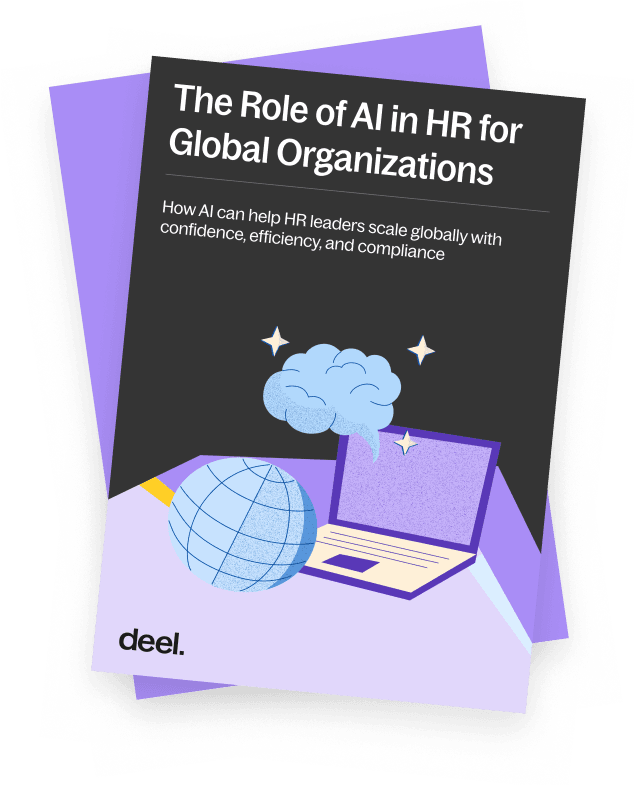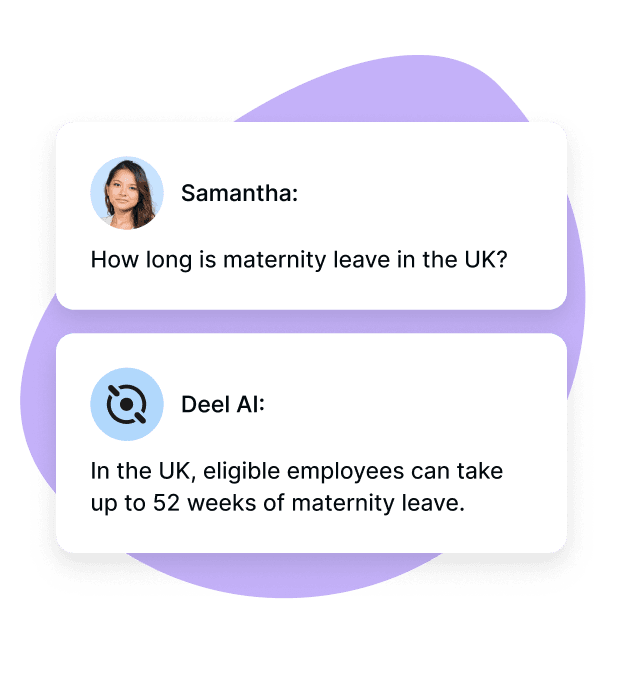Article
6 min read
AI in Payroll Beyond Chatbots: Eliminate Risk and Increase Efficiency
Global payroll
Deel Dialogue

Author
Bruce van Wyk
Last Update
January 07, 2026

Everyone’s buzzing about artificial intelligence (AI) and its potential to revolutionize HR and payroll. According to Gallup, 40% of US employees use AI a few times a year or more, and 19% use AI at least a few times a week. However, employees express concern when AI is involved with sensitive information. Over half (51%) of full-time employees are concerned about AI handling their payroll data.
While executives are pushing for AI chatbots to be built into product roadmaps, the deeper, transformative uses of AI for payroll are still largely overlooked.
It’s time to move past chatbots answering HR questions and explore how AI tools can tackle bigger challenges, like managing compliance in different countries or catching payroll errors before they happen.
Most payroll software and systems aren’t leveraging AI capabilities to their full potential, but they could—and should.

Why AI is perfect for payroll
AI thrives on large, complex datasets—the exact reality of enterprise payroll. From constantly changing compliance laws to varying local regulations, managing payroll data on a global scale can be tedious and time-consuming.
AI can reduce administrative burden across multiple systems, increase payroll accuracy and visibility, standardize global processes, and improve audits and compliance for finance and HR teams.
Here are the areas where AI can truly transform payroll systems and improve the experience for payroll teams and employees alike:
Increased payroll visibility and compliance
One common challenge in automated payroll is explaining why an employee’s paycheck amount changes from one cycle to the next.
Gross-to-net pay can vary due to reasons like expense reimbursements, bonuses, commissions, benefit adjustments, or foreign exchange rate fluctuations.
More significant changes can happen due to country-specific policies, like the 13th-Month Pay in the Philippines or the Czech Republic’s new tax legislation for non-monetary benefits.
Traditionally, payroll managers had to manually explain these differences, a process that is both time-consuming and prone to error. But AI tools can now automate this.
Advanced models analyze payroll data in real time, identify the root causes of paycheck changes, and break them down into clear line items for both employers and employees. This eliminates confusion, improves transparency, and ensures everyone receives accurate payroll reports.
Simplified expense management
Expense management is a persistent pain point for global enterprises, as laws and requirements differ across countries. AI technology can automate these processes, reducing errors and compliance risks on a large scale.
For instance, AI can check receipts and invoices against local laws, flag duplicates, and even compare submissions to third-party databases to spot fraud.
For employees, AI tools can provide instant feedback during expense submissions. If a claim exceeds a per diem limit in a specific country or doesn’t meet local tax rules, the AI system can flag the issue in real time and explain how to fix it. This saves time and frustration, making the process more efficient for everyone involved.
Deel AI
Automating processes and integrating systems
Payroll processing often involves repetitive manual tasks, like customizing reports or transferring information between systems. AI capabilities can automate these workflows, helping payroll teams save time and reduce human error.
Take PaySpace, for example. They’re testing AI-driven optical character recognition (OCR) to interpret tax documents provided by revenue authorities.
By automating data entry, the AI system maps required fields directly into payroll systems, creating accurate reports without manual intervention.
Over time, this eliminates the need for developers to configure templates, streamlining payroll runs and making localized reporting faster and more efficient.
AI also has the potential to transform user interactions with payroll software. Imagine a payroll manager asking task-specific questions directly within the system, like “What’s the tax withholding rule in France for 2024?” or “How many contractors are on payroll in Europe this year?”
Employees could do the same, asking for clarification about payroll deductions or benefits packages in real time without needing to navigate to a separate chatbot.
Why this matters for enterprises
Payroll is one of the largest monthly expenses for any business. Improving payroll systems, ensuring global compliance, and giving teams faster access to critical payroll data aren’t just operational improvements—they’re business-critical.
AI in payroll processing has the potential to become an enterprise's most valuable ally. Automated payroll processes, compliance assurance, and the ability to adapt dynamically to new requirements make AI a game-changer.
But for AI to truly deliver on this promise, it needs to move beyond surface-level applications and tackle the real challenges facing payroll teams today.
By embedding AI capabilities into the core of payroll software, enterprises can revolutionize the way they handle payroll and HR tasks, save time, and create a smoother, more transparent experience for employees and managers alike.
This isn’t just the future of payroll—it’s already happening. AI is here to transform the way we work, one payroll run at a time.
Platform Tour
Deel Payroll combines powerful automation, integration, and AI-driven features to help you streamline processes, ensure compliance, and eliminate risk. Book a demo to learn how Deel’s innovative tools can optimize your payroll operations and integrate with your existing systems.
This article was originally published on ERE.net.

Bruce van Wyk is a tech entrepreneur, global payroll pioneer, and CEO of PaySpace by Deel.
An IT graduate, van Wyk’s career started in software development, designing, conceptualizing and implementing functional payroll and HR solutions for various local, multinational and blue-chip organizations.
Throughout his career, he has solved complex payroll requirements for customers gaining critical insights into the receiving end of the payroll and HR product world, before applying that experience and expertise to PaySpace by Deel.















